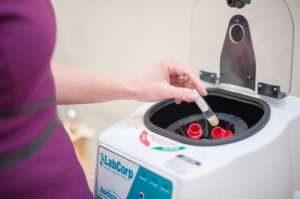Without thyroid testing, it can be hard to tell if you have thyroid abnormalities on your own. You might feel run down and tired, or be experiencing “brain fog.” You might be gaining weight, pregnant, or experiencing hair loss. Other symptoms include feeling “hyper,” anxious, or sweating more than usual.
Many processes in the body are regulated by the thyroid gland. Recognizing thyroid conditions and finding treatment is key for your health and the prevention of long-term problems. Continue reading to learn more about the thyroid gland, detection, and treatment through Functional Medicine.
What is a thyroid test?
The thyroid gland produces hormones that are essential for normal body metabolism. This butterfly-shaped gland in front of the neck acts as the body’s “control center”. The hormones secreted in the thyroid gland help maintain the heart, all muscles, and basically reach far into the body to control everything from brain to bowels.
At least 30 million Americans have a thyroid disorder and half of them–15 million–are undiagnosed according to the American Association of Clinical Endrocrinologists. Women are 10 times as likely as men to have a thyroid problem. If you are a woman over 35, your odds of a thyroid disorder are high, more than 30% by some estimates. Blood testing is now commonly available to determine the levels of thyroid hormones. These tests can determine if the hormone production is normal, overactive, or underactive. The thyroid gland has a profound impact on metabolism, which leads to two most common complaints from people challenged by a thyroid disorder: weight loss and weight gain. Unfortunately, those facing a thyroid problem are also at an increased risk of cardiovascular disease and diabetes.
It’s hard to tell if you have thyroid abnormalities. You might feel run down and tired, or have what is known as “brain fog.” You may be gaining weight, pregnant, or experiencing hair loss. Others may feel “hyper,” anxious, or sweat a lot more than usual. All of these are common symptoms of thyroid disorders. The thyroid gland regulates many processes within the body, and women are particularly likely to have disorders that affect the function of this essential gland. Recognizing and treating these conditions is critical for optimum health and preventing long-term health problems.
When something goes awry with the thyroid, this leads to under-activity or overactivity of the gland. These two types of conditions — hyperthyroidism and hypothyroidism — affect the thyroid in different ways and therefore have distinct symptoms.
Hyperthyroidism, an overactive gland, can accelerate the body’s metabolism which may cause many medical problems including high blood pressure, significant sudden weight loss, rapid or irregular heartbeat, sweating, nervousness, or irritability.
Hypothyroidism, an underactive gland, causes extreme fatigue, an intolerance to cold, constipation, dry and flaky skin, forgetfulness, and uncontrolled weight gain among other symptoms. If you experience any of these symptoms of thyroid disorders, either overactive or underactive, a thyroid test is recommended. A blood test involves drawing blood at a health care provider’s office or at a commercial facility
While the American Thyroid Association recommends yearly screening for thyroid abnormalities starting at age 35, you may need more frequent tests if you have symptoms or are at risk for thyroid disease. Both hypothyroidism and hyperthyroidism are most common in women over the age of 60. A family history of thyroid disease also increases your risk of developing thyroid complications.
 Visiting a Functional Medicine healthcare provider, like Aligned Modern Health, is the first step in diagnosing a thyroid condition.Blood tests can diagnose many thyroid conditions by detecting your level of thyroid-stimulating hormone (TSH), a hormone that controls thyroid activity. If your TSH is high, this signals your thyroid function is low (hypothyroidism). Low levels of TSH indicate hyperthyroidism. Your healthcare provider may also order tests to determine levels of other thyroid hormones.
Visiting a Functional Medicine healthcare provider, like Aligned Modern Health, is the first step in diagnosing a thyroid condition.Blood tests can diagnose many thyroid conditions by detecting your level of thyroid-stimulating hormone (TSH), a hormone that controls thyroid activity. If your TSH is high, this signals your thyroid function is low (hypothyroidism). Low levels of TSH indicate hyperthyroidism. Your healthcare provider may also order tests to determine levels of other thyroid hormones.
In addition to a blood test, your doctor may also use ultrasound, a thyroid scan, or a radioactive iodine uptake test. Typically, a simple blood test is all that’s needed to determine if symptoms you are experiencing are related to regulating your thyroid.
At Aligned Modern Health, our doctors use Functional Medicine as a comprehensive approach that identifies and addresses the root cause of health concerns, illness and disease. By finding the root cause that is driving your symptoms, only then are we able to understand how your body functions and how to get it back into balance.
When addressing your thyroid and health concerns, we begin with a thorough assessment of your medical and lifestyle history. After which our doctors will order the appropriate diagnostic exams and thyroid testing, intended to get a comprehensive picture of your health bio chemical make up. After your lab assessments are completed, you and your doctor will work together to create an individualized treatment plan and course of action that gets to the bottom of your symptoms so that you can end the cycling of simply masking your body’s warning signs.
Click here to learn more about our Functional Medicine services and to schedule an appointment for a complimentary consultation.










